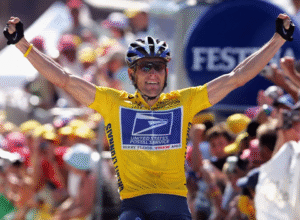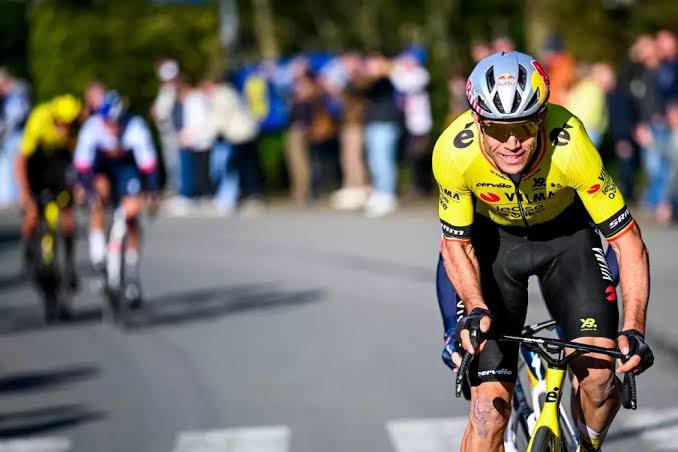**‘Promise You That’: Lance Armstrong’s Astonishing Doping Denial and the Legacy of Deception**
In a stunning turn of events that reignited longstanding debates about integrity and truth in professional sports, Lance Armstrong, the once-celebrated American cyclist, made a bold and controversial claim in 2019: his use of performance-enhancing drugs (PEDs) had no impact on his Tour de France victories. Now, in a recent interview published in 2025, this assertion has resurfaced, prompting widespread discussion about accountability, redemption, and the enduring shadows of doping scandals.

The Rise and Fall of a Cycling Legend
Lance Armstrong’s journey from a promising young cyclist to a global icon is one of the most compelling stories in sports history. Between 1999 and 2005, Armstrong won an unprecedented seven consecutive Tour de France titles, earning him a place among cycling’s all-time greats. His inspiring comeback from cancer and his relentless determination captured the imagination of millions worldwide.
However, the narrative was dramatically upended in 2012 when an investigation revealed he had used performance-enhancing drugs throughout his career. The U.S. Anti-Doping Agency (USADA) concluded that Armstrong had orchestrated a sophisticated doping program, leading to the stripping of all his Tour titles, a lifetime ban from professional cycling, and a tarnished legacy.
Despite the official verdict, Armstrong has maintained a complex stance. While he publicly admitted to doping in 2013, he often defended his achievements, suggesting that doping was a widespread issue in cycling at the time and questioning whether it truly impacted race outcomes.
The 2019 Interview: A Bold Denial
In 2019, Armstrong made headlines with an interview where he claimed that his doping had no bearing on his victories. “If you just had this one thing and did none of that,” he argued, “you get last.” This provocative statement implied that doping was so rampant that it might have been a level playing field—an assertion that many critics found both audacious and dismissive of the integrity of the sport.
He further suggested that the belief performance-enhancing drugs were necessary to compete at the highest levels in Europe was a driving force behind athletes’ decisions to cheat. “We left out a part, but we did all that stuff,” he said, referring to the doping practices, “because now this one thing is part of the story doesn’t erase all that. All that happened.”
The 2025 Interview: Reaffirming Controversy
Fast forward to 2025, and Armstrong has once again made headlines with statements that challenge the accepted narratives of his doping era. In an exclusive interview, he doubled down on his previous claims, asserting that his victories were legitimate and that doping did not influence his performance or results.
This stance has ignited fierce debates within the cycling community, sports ethics circles, and among fans. Critics argue that such claims undermine the efforts of clean athletes and the integrity of competitive sport. Supporters, or perhaps those sympathetic to Armstrong’s complex perspective, contend that the culture of doping was so pervasive that it blurred the lines between fair play and cheating.
The Broader Impact: Truth, Denial, and the Culture of Doping
Armstrong’s assertions highlight a recurring challenge in sports—distinguishing between truth and denial in doping scandals. His claims echo sentiments from other athletes who have faced similar allegations, often asserting that doping was a systemic issue, or that it did not give them an unfair advantage.
Historically, doping scandals have tarnished sports’ reputations, prompting stricter regulations, testing, and anti-doping campaigns. Yet, the question remains: To what extent do athletes and organizations foster environments where performance-enhancing drugs become normalized? And can any victory truly be deemed legitimate when the playing field is so heavily skewed?
The Ethical Dilemma: Can Redemption Come Without Accountability?
Lance Armstrong’s case exemplifies the complex interplay between redemption and accountability. After years of denial and later admission, he has attempted to rebuild his image through charity work and public appearances. However, his recent claims threaten to undo any progress, casting doubt on his sincerity and the authenticity of his achievements.
Many argue that acknowledging past mistakes and cooperating fully with anti-doping efforts are necessary steps toward genuine redemption. Others believe that dismissing doping’s impact altogether diminishes the sacrifices of athletes who competed clean.
Public Reaction and Future Implications
The public’s response to Armstrong’s latest statements has been polarized. Some fans express sympathy, citing the systemic pressures and culture of doping prevalent during his era. Others criticize him for undermining efforts to promote integrity in sport.
Leaders in cycling and sports governance face mounting questions about how to restore trust and prevent similar scandals in the future. Initiatives such as advanced testing methods, transparency, and fostering a culture of clean competition are more critical than ever.
A Legacy Mired in Controversy
Lance Armstrong’s claims about doping and their impact—or lack thereof—remain one of the most contentious issues in sports history. Whether viewed as a misguided attempt to rewrite history or a genuine belief rooted in his experiences, these statements serve as a stark reminder of the complexities surrounding athletic achievement, ethics, and truth.
As the debate continues, one thing is certain: Armstrong’s legacy is now intertwined with questions that extend beyond his race results. They challenge us to consider what fairness truly means in sports and whether redemption is possible without embracing accountability.


